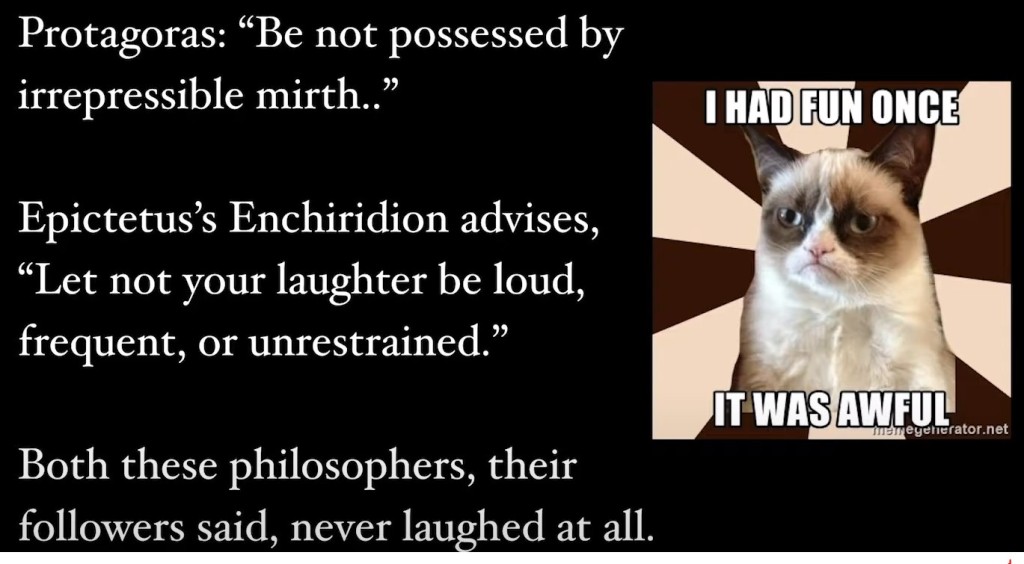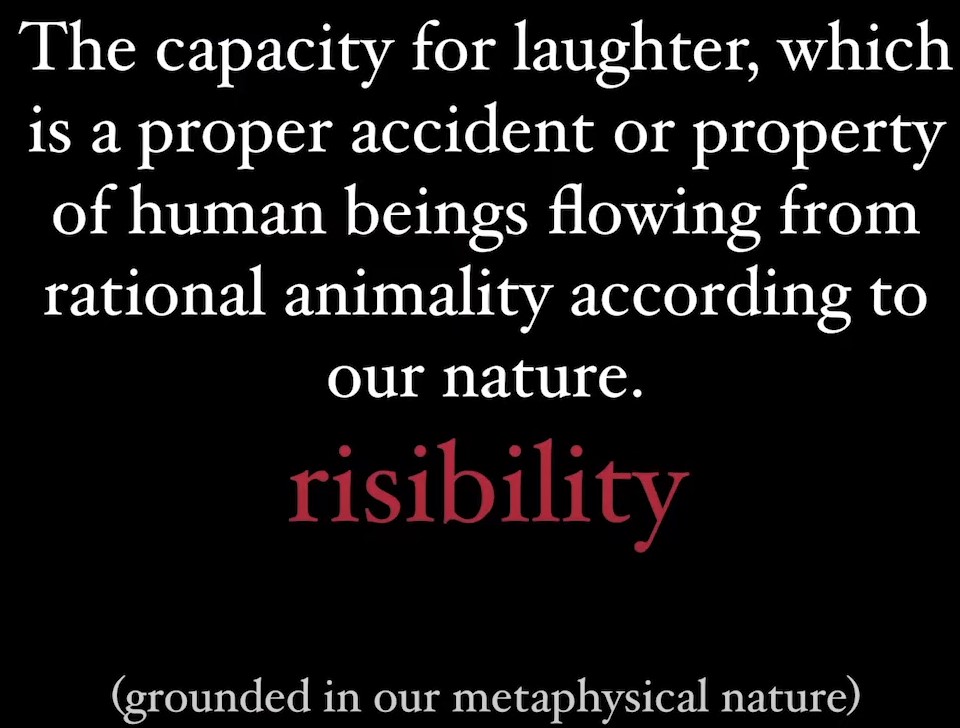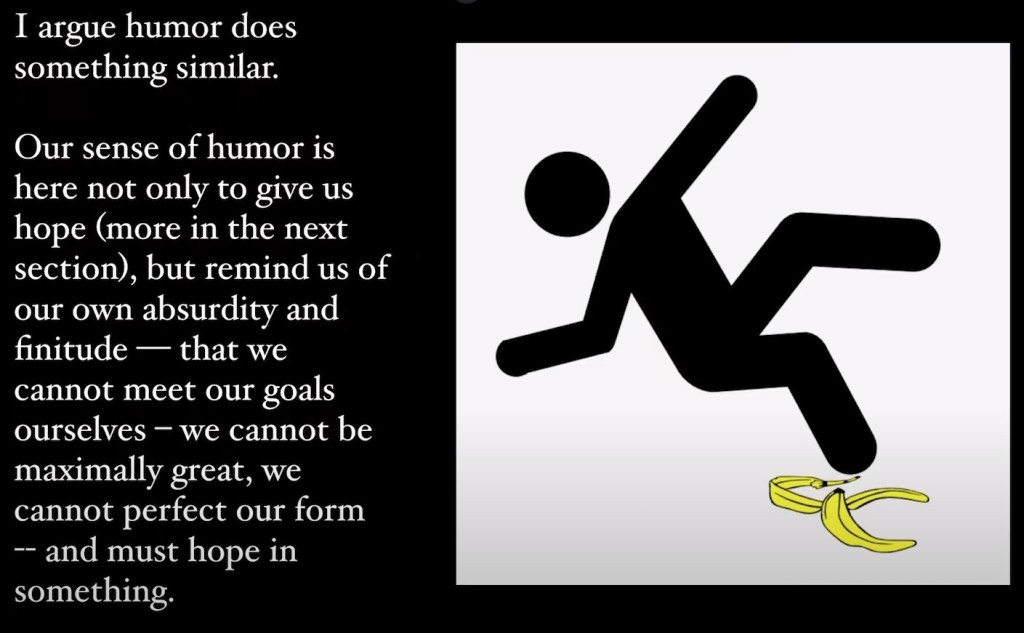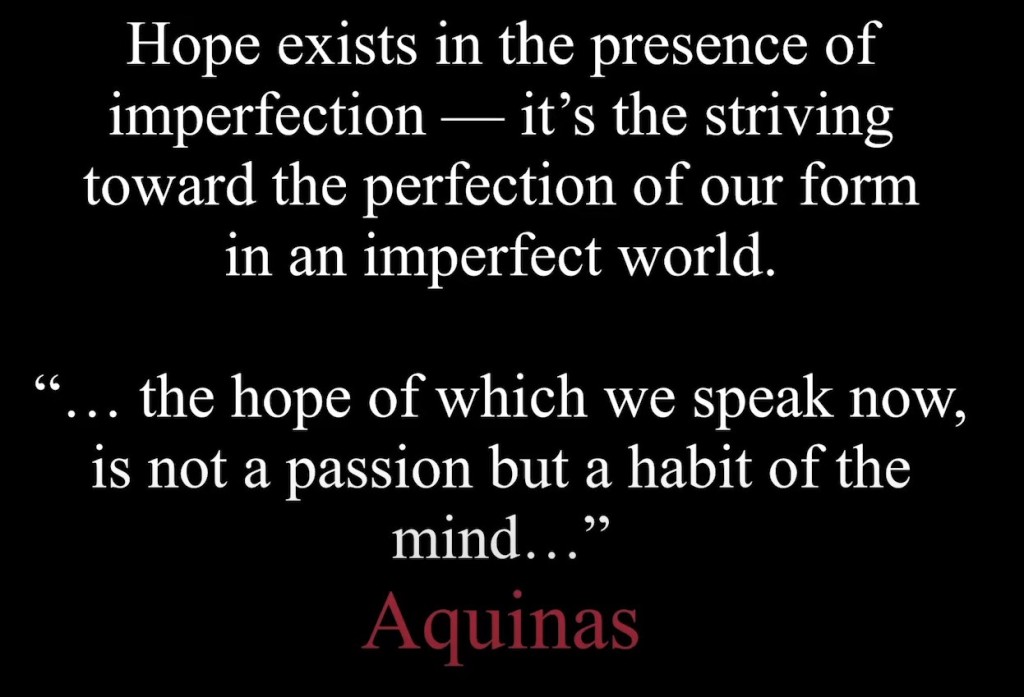The intellectual defense of the Christian faith (“apologetics”) is often seen as serious business. Mia Langford, however, makes the case that humor is a key part of being human. As such, humor can contribute to both the content of apologetics and the communication of that content. Here I summarize and comment on her talk, “Humor: The Black Sheep of Apologetics”, given at the 2020 annual National Conference on Christian Apologetics (NCCA).
This continues my writeups of presentations from that apologetics conference. Mia Langford has a background in psychology and biblical studies. She is pursuing a second masters in philosophy at Southern Evangelical Seminary, which hosted the NCCA.
Although it’s clear that most people value humor, philosophers have said little about it, and what they have said is largely critical. From Plato’s Republic: “If anyone represents men of worth as overpowered by laughter, we must not accept it.” And:

Theologians as a group haven’t been much better. John Morreall noted in Comic Relief, “Early Christian thinkers brought together these negative assessments of laughter from both Greek and biblical sources. Like Plato and the Stoics, they were bothered by the loss of self-control in laughter” . This is exemplified by the following quote from the ancient theologian John Chrysostom (347-407):

Mia surveyed some theories of what humor is and how it works.
( 1 ) Superiority theory: “Ha ha! I’m better than you!”
In this view, humor is antisocial, and meant to display dominance and aggression
( 2 ) Relief theory (nervous laughter)
Humor is a pressure release valve. We laugh to release nervous energy, but there is no rationality behind it.
( 3 ) Incongruity theory: “Ha ha! That’s crazy!”
Humor here is irrational. This is one of the most studied approaches currently. If I fall down the stairs and hurt myself it’s not funny, but if I fall down the stairs and don’t hurt myself it’s funny, because you’re not supposed to fall down the stairs.
The problem with all of these theories is that they capture just some aspects of humor while stopping short of capturing all aspects, instances, and purposes of humor. Many philosophers are more concerned with conceptual analysis than with causal explanation. They are focusing on the mechanism of humor, and not on the question of why we do this, what even enables us to do this sort of thing.
Thomas Aquinas was a notable exception to ancient and medieval thinkers as far as having a relatively positive view of humor. He traces it back to a cognitive virtue in man, as to why we laugh:

In other words, we could not laugh if we were not rational. So, Aquinas is grounding humor not in some sort of mechanism, which may or may not apply. Rather, he is grounding this in our metaphysical nature. This is much more of an umbrella term in terms of what we can account for.
The following slide illustrates the capability of a humorous image to immediately and powerfully communicate a message. In this case, it depicts the somewhat fraught relationship between traditional philosophy and “analytic” philosophers, who long for the sort of clarity enjoyed by math and hard sciences.

Cleverness Theory of Humor (“Rational Play”)
Analytical philosopher Steven Kimble at Gettysburg College has introduced a new theory of humor, called Cleverness Theory (“You’re killing it!”). In this view, humor is “rational play”.

Humor is the product of two aspects of human nature, play and cleverness (rationality). This view was not born purely of philosophical speculation, but from real world observations. It dovetails with Aquinas’ thoughts on risibility and with his general notion that we begin or should begin our thinking with sense data.
Gimbel once called into a radio show because they had an ethical question. He ended up going out with them, and he started hanging out with the circle of comedians. Then he started to think, “I should explore this, I should try my hand in comedy.” So, his theory of humor is born of firsthand experience in watching and interacting with comedians. It is not an ivory tower theory. He is working from a real data set.
Like Aquinas, Gimbel sees humor grounded in our rationality. He defines “play” as using something in a way it was not intended to be used. In violating our expectations, this goes back somewhat to Incongruity Theory.
But also important is “cleverness”, which he defines as displaying cognitive virtue. Cognitive virtue is anything that displays real world application, so there is some rationality involved.
Different comedians have different angles. Some are really good at nailing down the details, or are good at noticing patterns, or at improvisation. There is something about them that is very clever, which flavors their styles of humor.
When you combine the playful nature of man and the rational nature of man, you get “rational play.” This has great explanatory power, because it is an umbrella term. It covers instances where people use humor to display artistic beauty or to express dominance or just to entertain.
Why God Designed the Capacity for Humor into Our Nature
Philosophically, the explanation of phenomena in terms of the purpose they serve, and theologically, the doctrine of design and purpose in the material world, is “teleology.” In other words, why are things the way they are? What is the underlying purpose and underlying final destination?
Here we try to tease us apart why God made us the way he did. This is important – – When you learn something about the design it says something about the Designer. So, if we understand why he designed us that way, we may get a window into God’s mind.
“Works of art , like jokes have a function. They are objects of aesthetic interest.” – Roger Scruton
“Gags have goals” – Steven Kimble
One reason why God may have designed the capacity for humor into our nature is simply for “delight.” There is a sheer pleasure and happiness that results from humor. Humor and other forms of beauty serve as “teasing revelations” of various aspects of God’s nature:

Humor hints at God’s “eternal, infinitely high spirit”. God has joy, he doesn’t change. This joy, this high spirit is different from fleeting emotion.
“I believe that laughter is a language of God” – Yakov Smirnoff
Humor can communicate truth or falsehood. But if I tell a joke like why did the chicken cross the road, I’m not trying to impart some truth about the world or chickens or roads, the purpose is simply pleasure and entertainment, and may be bonding:

Beauty for beauty’s sake is not impious. God is generous.
Another purpose for humor is humility – to communicate humility, help us stay humble. Family and friends can good-naturedly roast you, and that is fine. One the other hand, pride (self-worship) can’t tolerate being laughed at and can’t laugh at itself:

Pride often has a stiff, pompous overly-pretentious façade, which could be punctured by humor. Oscar Wilde said, “It is a curious fact that people are never so trivial as when they take themselves seriously.”

Our sense of humor about ourselves and the sense of humor of others makes us feel our own absurdity and finitude, serving as a buffer against pride. There are two lines of evidence to support this:

“The teleology of the Universe is directed to the production of Beauty”, according to Alfred North Whitehead. Many people report a sense of awe in the presence of extreme beauty. They become attuned to their smallness, to their finitude, compared to the grandeur of a mountain or the splendor of a sunset.
Mia argues that humor does something similar. Our sense of humor is here not only to give us hope, but remind us of our own absurdity and finitude – – that we cannot meet our goals ourselves and must hope in something outside ourselves to reach our optimal selves:

The universality of laughter needs to be explained in terms of its association with the absurd, which itself is ubiquitous. Humor is a universal experience because, in Kierkegaard’s words, “Where there is life there is contradiction, and wherever there is contradiction, the comical is present.”
We have a sense of beauty because there is beauty in the world. We have a sense of humor for the same reason. So, the first line of evidence [that humor is a God-given gift to us] is that humor is built into the universe.
A second line of evidence is that what man looks like spiritually when he is trying to suppress humor, is very telling. “When humor goes, there goes civilization” – – Irma Bombeck.

[A contemporary example that comes to my mind, not mentioned by Mia, is that the Chinese government has banned images of Winnie the Pooh, because people were amused at how that cartoon character’s face bears an uncanny likeness to that of the all-powerful President Xi].

People with no sense of humor themselves become a joke. In historical case studies, rather than adjust their self-perception and discard their inflated sense of self-importance and entitlement to power and praise, these regimes doubled down violently. So, we see the regulation of humor, people having to submit their jokes to get them approved, you see people driven underground or even killed.

Mia addresses the question, what about in the Bible, where God is laughing at his enemies – – is that a negative portrayal of laughter? Well, the Bible is the story of redemption, of a perfect God coming to redeem an imperfect world, he’s coming to take back the keys from an evil despot, Satan, who took control of it.
The instances of laughter in the Bible where God is laughing at his enemies, it is not an indictment of humor, it is indictment of Satan. It’s this idea that God can laugh, because he ultimately triumphs over Satan, and Satan should be humble, as a created being. So, this view goes a long way in explaining why a lot of instances of humor in the Bible is where God is laughing at his enemies.
A third aspect of why God gave us humor is Hope. “Humor doesn’t leave us in a state of feeling only our absurdity, but in our wretched state, gently takes our hand and leads us toward the hope of eternal delight.”

Our hope exists in the presence of imperfection; Aquinas characterized such hope as a virtue:

Mia suggests connections between humor (as one form of beauty), hope, and human imagination:

(where “forms” is used here in a technical Thomistic sense)

“Did you have a happy childhood, or are you funny?” – – many comedians had unhappy lives. We live in a harsh world:

Humor can be learned. In Man’s Search for Meaning, Victor Frankel, described which mental habits helped inmates to survive life in Nazi concentration camps. There’s a passage where he taught his friend to have a sense of humor about the situation. It became vital for his survival, he would not have made it if he had not been able to develop the mental, spiritual, and emotional resiliency that humor provided in that situation.
Steve Lipman makes a similar point about how humor served as a psychological shield and morale booster in horrific Holocaust situations:

Humor involves a cryptic redefining. It is a perception shift – not a relativization of truth, but a perception shift about the objective world.
God has put the sense of eternity in our hearts, and beauty gives us a kind of preview of it:

Humor and Hope are products of an imperfect world, they are virtues to be cultivated in an imperfect world. They will see their full actualization in what they’re striving toward, in the next world.
Practical Applications from Insights on Humor
In the final section of her talk, Mia looks at how we can walk this out when we are trying to identify with the kingdom of God, remembering that we are dealing with precious people, people who love to laugh.
Application Note Number One: Be Unapologetically Funny
There are a lot of people in areas of serious study who forget this, and resent any attempt to treat their subject with humor:
Don’t conflate serious in the sense of grave with serious in the sense of important.
Being hostile to humor is not helpful, and humor can be a powerful tool in disseminating truth.
One reason why we have to accept this as apologists is that the other side is not going to stop using humor, but they want you to stop. Political leftists, for instance, understand the power of satire and ridicule:

They want to use satire and ridicule, but they don’t want others to use satire and ridicule. People want to characterize humor they don’t like as shameful or hate speech. They understand the power of satire; we cannot afford to let them censor it. It’s a canary in the coal mine, we need to start using it more.
Mia urges Christians not to be intimidated here. She cites the Babylon Bee as a conservative/Christian-themed news satire site, which was suspended for a time by Twitter:

There is a general blanket of “Stop joking around, stop using humor in this way”:

There has definitely been an erosion in freedom of expression. It’s alarming and it should be taken seriously. Don’t let people take it from you, because they’re going to try to stop you from using it, but they will use it themselves. So don’t give that ground.
Another reason Mia doesn’t want you to stop being funny is that we may be moving into a period of increased persecution, where we may need humor to keep us from caving. We must keep our humor, because it is a gift from God. Not only is it a gift from God for taking truth to other people, it is a gift from God for our own resilience.
We are entering into hard times in many ways. You need to keep your sense of humor, it’s something you can actively strive for. It is a virtue; you have to keep utilizing it and keep moving towards it. You have to hold onto it.
Application Note Number Two: Disseminate scholarship with humor.
For instance, if teachers just leverage the actual humor that is there in Shakespeare, students wouldn’t have any problem latching onto his works. With philosophy or apologetics or anything else, we worry that people aren’t interested, but they’d be plenty interested if we used humor more.

Even in the midst of serious controversy, “Don’t get mad, get funny”. Getting funny can be learned. It will benefit us and it will benefit our audience. And when you have the truth on your side, your memes will be stronger because you are reflecting reality.
Humor can be in your conversation, in your books and your performances. She would love to see more holistic presentations of apologetics in terms of artistic expression. The world could use it right now. The world is having a hard time, so they might appreciate it right now. They should be instantly receptive to anything they recognize as good and beautiful; they will resonate with that beauty.
Application Note Number Three: Humor is particularly helpful in regard to a pastoral response to the problem of evil.
There are answers to the intellectual problem of evil and suffering, but there is also a need for a pastoral response to meet the emotional needs of hurting people. This is where a sense of humor triggering a sense of hope can help. It can lay the groundwork for people to be more receptive to the intellectual answers. Mia noted that, obviously, she is not meaning to be inappropriate here, but she did not have time to go over the full ethics of humor in this “flyover” talk.
There are ethics of humor, but she wants us to understand how relevant the subject is. A lot of people could use more laughs. It’s a healthy thing.
In terms of people, people need to know that they can laugh, in a safe environment, and that will often set the stage for a more intellectually robust answer to their concerns. Anger at God is emotionally-based, it’s not intellectually-based, and somebody who can help them just feel better goes a long way.
We live in it in an imperfect world and sometimes there more truth in humor than in anything else:

In summing up, she noted that through the mechanism of humor, God is glorified. It points to him. Humor itself is an apologetic – it is a vehicle for apologetics and in itself is an apologetic.
In Jesus, God shows that he loves you. He is the source of all the laughter, all the good. You can invite him into your heart. Mia looks forward to the day when the following passage will be completely fulfilled:
Then our mouth was filled with laughter, and our tongues with shouts of joy; then they said among the nations, “The Lord has done great things for them.” The Lord has done great things for us; we are glad. – Psalm 126:2-3
In closing, Mia noted that she can offer fun talks on a variety of subjects. Her web presence is partly under the moniker “Black Sheep Pen”. She can be contacted at blacksheeppen.com , on Facebook at blacksheeppen (black, sheep, pen), and on Twitter at MiaMLangford. She will be releasing some blogs, and plans to put it all together in a book called Is God Ticklish? How Humor Points Us to God.
My Comments
Mia Langford’s presentation was engaging and edifying. It brought understanding of the underlying nature of humor and its importance in the human experience. She also shared suggestions for employing humor in writing and speaking. Her style is both entertaining and informative. She would do well as a speaker in a variety of venues.
This was a new topic to me, so I don’t have much to offer by way of either correction or of further resources. One omission that surprised me was that (unless I missed it) there was no mention of the humor of Jesus. Christians regard him as the exemplary human, so I expected at least a brief nod to Jesus by way of legitimizing the use of humor in Christian communication. A casual web search turned up number of articles on the subject, so there is plenty of material on this topic. The consensus is that Jesus frequently used subtle humorous images and wordplay along with devices like satire and hyperbole to make his points:
Jesus recognized that humor is as equal a part of the human condition as suffering and joy. It is integral to the human condition, and Jesus embodied this just as much as he embodied forgiveness, compassion and hope. Jesus had a wonderfully vibrant sense of humor, but it wasn’t employed merely to “get laughs.” It is humor that seeks to inform and convert. Even when the humor is directed at a certain group, such as the Pharisees, it is still a humor born of love and compassion. Jesus mocks the self-righteous even while calling them to open their eyes, repent and see.
Jesus exposes our human foibles not to embarrass or condemn but to illuminate and transform. When we take ourselves too seriously, we commit perhaps humanity’s greatest sin: trusting in ourselves rather than God. Jesus shows us the absurd consequences that invariably result.
Presumably Mia was aware of this material on Jesus, but chose to omit it in the interest of time. She did note that she had to omit depth discussion of the ethics of humor. That would be of interest to provide practical guidelines for Christians engaged in writing and speaking. Other parties seem free to employ vicious and deceitful satire to further their agendas, but a consistent Christian presenter cannot depart from honesty and genuine personal concern for all people, even one’s opponents.
Final comment — Mia’s presentation was largely focused on using humor intentionally to get across apologetics points. That is fine, but I’d like to add that I think there is also general value in simply being a fun person to be around. Tasteful, positive humor is part of that. Here is a random YouTube video I ran across with some tips on how to do that: 4 Jokes That Make People Instantly Like You.

Why did random evolution program laughter into us (and dolphins and other creatures)?
Without researching the subject (so I could be far off), it seems to me humor is useful for promoting team work and strengthening social ties. I enjoyed working with others who were humorous. It also can be used as a way to exclude outsiders and unite a tribal group against them. So once evolution stumbled on it, it promoted survival and reproduction and thus was selected for.
I suspect neuroscientists have located specific regions of the brain that react to humor, and the chemicals they trigger.
There are many wonderful things an omnipotent god could have given us by magic such as telepathy or the ability to walk on water. Evolution could only give us things which are physically possible in this universe. That is one of many clues as to the usefulness of the god hypothesis, it seems to me.
Jim, Good point about humor, or something like it, in animals. There seems general agreement that some of the more intelligent (“rational”) animals do play. Like dolphins and otters. Presumably Mia Langford would need to address that in her book, lest she be charged with unwarranted “human exceptionalism”.
I don’t think that Thomists would dispute that, mechanistically, the capacity for humor could have developed via evolution. I think they just take a step back and ponder what it might mean for a Supreme Being to create and hold in being every second a physical universe where intelligent life forms can evolve and live and joke around.
(The Apostle Paul quoted a Greek philosopher to the effect that “In Him we live and move and have our being”)
Dear Scott Buchanan and JimV,
I have enjoyed reading this excellent post regarding humour and your conversation here.
Scott, I would like to inform you that there is a typo in your sentence “Here we to try to tease us apart why God made us the way he did” insofar as the first instance of “to” should have been omitted.
Happy mid-October to both of you!
Yours sincerely,
SoundEagle
Thanks for the notification, I corrected that typo.
Cheers…
Good one overall. keep them coming Scott.